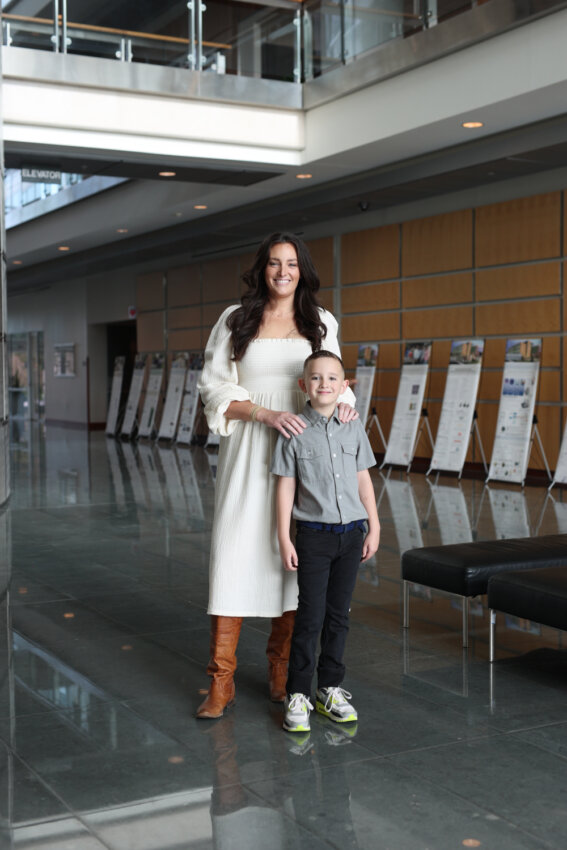Elizabeth Orcutt first learned about Li-Fraumeni syndrome — a hereditary cancer predisposition syndrome that increases the risk of certain types of cancers — in October of 2019 after her then 6-year-old daughter Lydia Orcutt woke up feeling unwell.
“She was extra, extra cuddly and complained of a stomach ache,” Orcutt recalled. “Her symptoms rapidly escalated and her emergency nurse daddy knew immediately we needed to call an ambulance.”
Later, Lydia underwent a brain biopsy. A four-centimeter mass was found on her brain, soon after revealing evidence of a genetic mutation in a gene called TP53. This gene acts as a stopping mechanism for cells that divide too fast. Mutations in this gene mean that the gene can’t control the growth of cells, thereby increasing the risk of certain types of cancers.
Lydia had also tested positive for the BReast CAncer gene 1 (BRCA1) mutation. The TP53 gene had been passed down to both her and her brother Silas from their father’s side of the family.
Despite the diagnosis, Lydia didn’t show any physical or mental decline until Nov 2020, when the then 7-year-old began to suffer from headaches and slept most of the day. On Nov. 18, 2020, Lydia passed away.
Now 7-year-old Silas, who also carries the TP53 gene mutation, is currently cancer free and is tested every three months as a precautionary measure under the care of Gail Tomlinson, MD, PhD, division director of pediatric hematology-oncology at UT Health San Antonio.
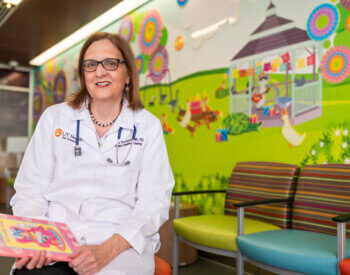
Tomlinson is a physician-scientist studying hepatoblastoma and other aggressive liver tumors in children at the Greehey Children’s Cancer Research Institute (GCCRI). She sees patients at the South Texas Pediatric Blood Disorders and Cancer Center at University Hospital, a clinical partnership of UT Health San Antonio and University Health.
Orcutt said knowing that Tomlinson is monitoring her son gives her peace of mind at night.
“[Dr. Tomlinson] is an incredible human,” Orcutt said. “We’ve had our fair share of exposure to pediatric oncologists throughout the years, and I’m struck by Dr. Tomlinson’s humility. It’s very rare and very needed, especially with parents who are so emotionally drained. Having someone that’s just so kind in your corner makes a world of difference.”
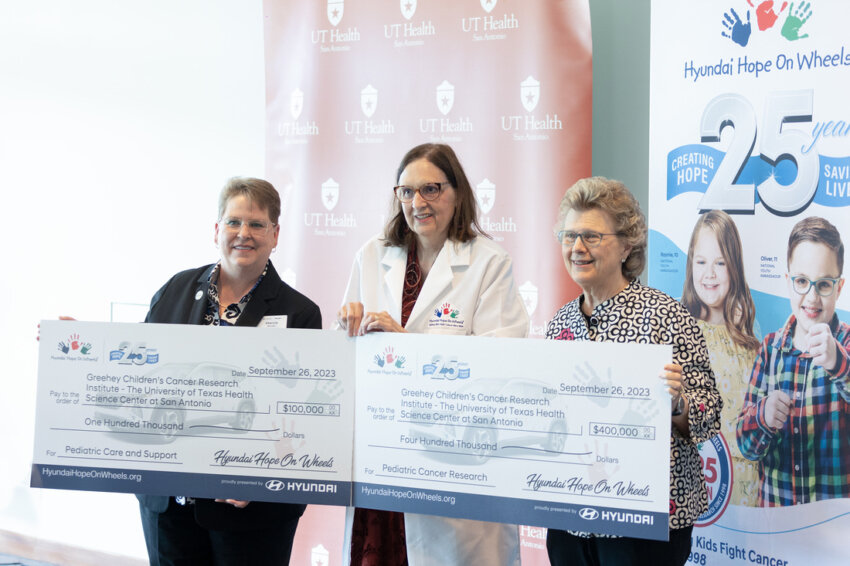
To help in the fight against childhood cancer, Tomlinson received two grants totaling $500,000 at the Hyundai Hope on Wheels® event at the GCCRI Sept. 26. With these grants, research support from Hyundai Hope on Wheels® has exceeded $2.1 million at UT Health San Antonio.
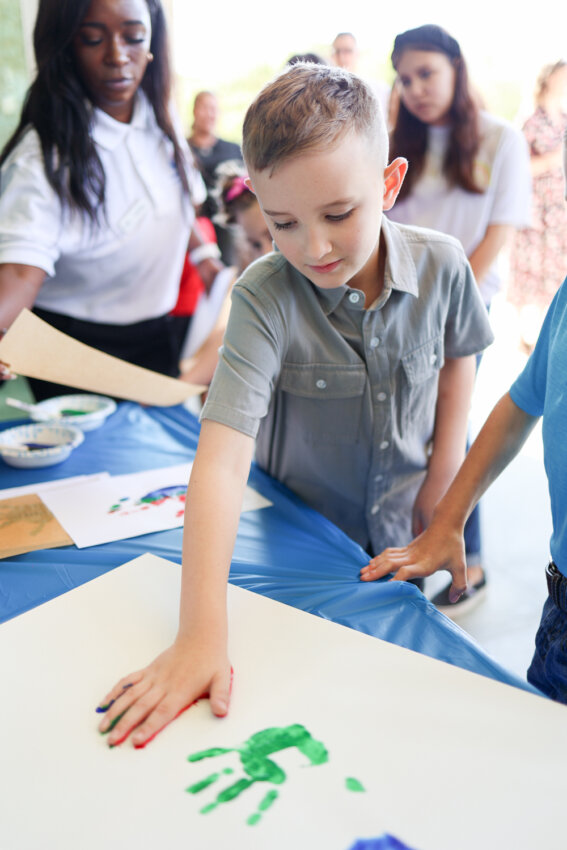
During the event, Silas and also other children who are undergoing cancer treatment or are survivors, attended with their families and dipped their hands in finger paint to leave their mark on a new Hyundai SUV that will travel across the country to help raise awareness about childhood cancer. The handprints represent children battling cancer, children who survived cancer and children whose memories live on during Childhood Cancer Awareness Month, a month dedicated to increasing awareness of pediatric cancer and to raise funds for research.
Watch this video capturing special moments from the event.
Representatives from Hyundai Motor America and Hyundai Hope on Wheels® presented Tomlinson with the two grant awards. The first was a $400,000 Hyundai Hope Scholar Grant Award to study new mechanisms for treating liver tumors, including those resistant to conventional therapies.
“The Hyundai Hope Scholar Grant Award was on a project that’s very near and dear to me,” Tomlinson said. “It’s looking at childhood hepatoblastoma, which is an aggressive tumor [in the liver] that occurs in young infants and toddler children. [The grant] couldn’t have come at a better time because we’re very well positioned to do some really exciting work.”
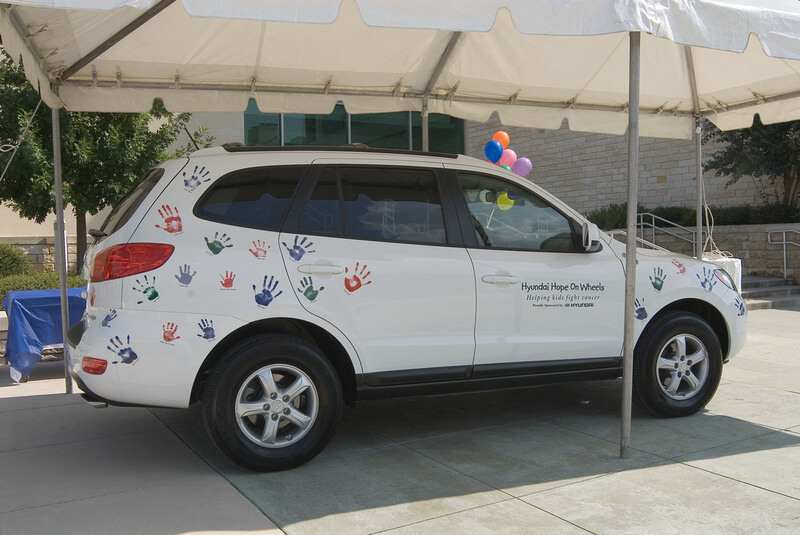 The second grant — a $100,000 Hyundai Impact Grant Award — was also given to Tomlinson’s genetics team in the division of pediatric oncology to expand the availability of genetic testing at University Hospital’s pediatric clinic. Tomlinson said genetics is another area of particular interest for her and her team and has become increasingly important for cancer care.
The second grant — a $100,000 Hyundai Impact Grant Award — was also given to Tomlinson’s genetics team in the division of pediatric oncology to expand the availability of genetic testing at University Hospital’s pediatric clinic. Tomlinson said genetics is another area of particular interest for her and her team and has become increasingly important for cancer care.
“We’re finding out there are so many genes that contribute to cancer, that if we do genetic profiles on more children, we’d find more aberrant genes that may have caused them to be at higher risk, but also help direct therapy in some instances,” Tomlinson said. “The Hyundai Impact Grant Award is going to permit our genetic counselors to see more patients. Hopefully, every child … will have access to genetic testing if that seems appropriate for that child.”
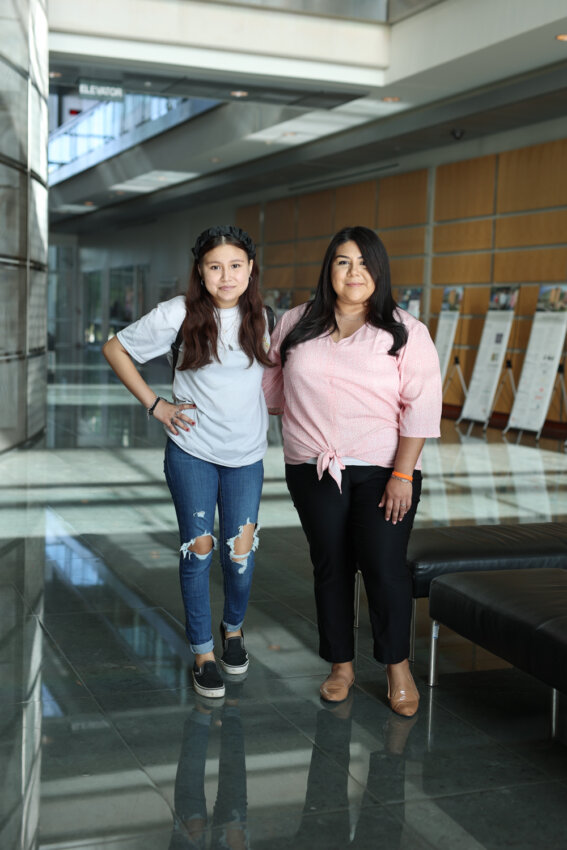
For Laura Ibarra, attending the Hyundai Hope on Wheels® event signified hope for the future of research and genetic testing. Ibarra has multiple family members who’ve been diagnosed with acute lymphoblastic leukemia (ALL), including her 13-year-old daughter Jaelyn Escobedo.
“It’s very important to have that kind of funding to keep studying and researching why cancer … has been probably one of the top diagnoses among children,” Ibarra said.
Jaelyn was diagnosed with ALL on March 8 after noticing visible lymph nodes on her neck. She is now a little over six months into her treatment of oral and infusion chemotherapies and says she feels good.
“Seeing other families and children and knowing we’re not alone in this … [it’s] good for [Jaelyn] to see that,” Ibarra said.
Orcutt expressed a similar sentiment. After Lydia’s passing, she began looking back on her daughter’s cancer journey and shared three important lessons inspired by her daughter. One of the lessons includes the power of support from others.
First, she shared that her new favorite word is “and” because feelings like grief and joy, fear and peace, and guilt and contentment are not mutually exclusive. “We’re allowed to feel both at the same time,” Orcutt said.
Second, “See the magic in the mundane and everyday tasks,” Orcutt said, adding that it’s important to mentally freeze certain moments and “delight in your children and family.”
The final lesson is to “rely on the wisdom of those who have walked a similar path before you,” she said.
Thanks to a tight-knit online cancer and grief mothers’ support group that adopted and supported her when she needed it most, Orcutt was able to focus on the now.
“Stop thinking about tomorrow, or next week or next month, or next year,” Orcutt said of family members in the midst of emotional pain. “Your goal is making it through today, or heck, the next 15 minutes on those darkest days. Itty bitty baby steps were essential to me as I learned how to manage my grief and slowly take my life back. And boy, did I have some amazing women model this for me.”


